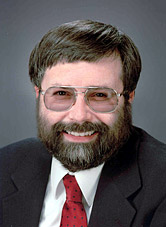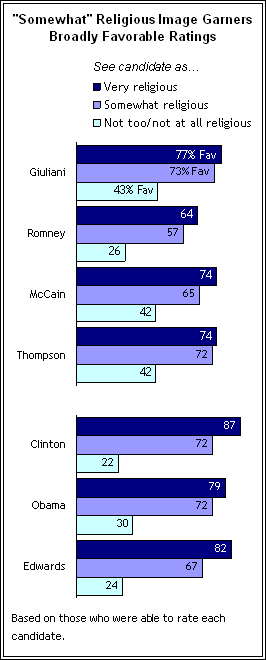From Mitt Romney’s December speech on religion in American politics to Barack Obama’s efforts this month to label himself a “committed Christian,” the personal faith of candidates has played a significant role in the 2008 campaign. Pew Forum Senior Fellow John Green answered questions about the history of faith in presidential politics, campaign efforts to religiously define candidates and how the faith factor might impact Super Tuesday.
Featuring: John Green, Senior Fellow in Religion and American Politics, Pew Forum on Religion & Public Life
Interviewer: Mark O’Keefe, Associate Director, Web Publishing, Pew Forum on Religion & Public Life
In this Q&A: Faith in presidential politics Candidate faith in 2008 How the faith factor might impact Super Tuesday

Historically, has strong personal faith been an asset to presidential candidates?
Historically, strong personal faith has often been an asset, particularly if a candidate was a member of what was perceived as a “mainstream” faith. Throughout most of American history, these mainstream faiths were various kinds of Protestantism. For candidates whose religion was perceived to be outside of the mainstream, personal faith has been more of a detriment than an asset.
Perhaps the most famous examples are Roman Catholic candidates. By the late 19th century, Catholics were a large part of the American population. But many Protestants viewed Catholics with a great deal of suspicion, making it very difficult for Catholics to run for president. In fact, only one Catholic has successfully run for the White House, and that’s John F. Kennedy.
Has the situation changed in recent times?
Yes, it has. In the last 30 years or so, religious affiliation has become somewhat less important to voters and the religiosity of a candidate has become more important. Certainly candidates have talked more about their faith during this time period. A good example is Jimmy Carter in 1976 who talked about being a born-again Christian. Ronald Reagan in 1980 and Bill Clinton in 1992 also talked a good bit about their faith and, of course, so did George W. Bush in 2000 and 2004. These examples suggest that candidates’ personal faith can help them attract voters.
How has the personal faith of candidates been a factor so far in the 2008 presidential campaign?
So far, the 2008 campaign appears to be a continuation of the trend of the last 30 years. Candidates in both parties have talked a good bit about their faith. On balance, these discussions appear to have helped most of the candidates. Survey evidence offers some hints as to why this may be the case. A large number of Americans tell pollsters that they prefer a president of strong personal faith. In fact, a summer 2007 poll by the Forum and the Pew Research Center for the People & the Press found that almost seven-in-ten Americans agreed with the statement, “It’s important to me that a president have strong religious beliefs.”

The same poll found an interesting relationship between respondents’ perception of candidates’ religiosity and their favorable views of the candidates. Basically, the more a candidate was perceived to be “religious,” the higher the candidate’s favorability.
These patterns suggest that personal faith can be a valuable asset for presidential candidates. However, these questions are asked in the abstract, and they translate into actual support for candidates in complex ways. For example, the same poll found that Hillary Clinton and Rudy Giuliani were perceived as the least religious of the presidential candidates and that this perception reduced their favorability with the public. But a different summer 2007 poll from the Pew Research Center for the People & the Press showedClinton as the leading choice for the Democratic nomination (with the support of 40% of registered Democrats) and Giuliani as leading among the Republicans (with the support of 27% of registered Republicans). And the candidate perceived as most religious, Mitt Romney, was further behind (with the support of 10% of registered Republicans).
How did these complex perceptions play out in the primaries?
Personal faith is not the only thing that matters in choosing a president, and Clinton and Giuliani may have owed their summer leads in the polls to other factors. But it may well be that they may have been further ahead at that point if they had been perceived as more religious. Both Clinton and Giuliani eventually faced strong challenges in the primaries from rivals who were perceived as more religious. In Giuliani’s case, the lack of support from religious voters may have been one reason for his eventual withdrawal from the race.
Another example of the complex role of personal faith in presidential politics is the situation with Mitt Romney. The Pew Forum summer survey found that Romney benefited from the perception that he was religious. But the same survey found that about one-quarter of the respondents were skeptical of voting for a Mormon for president. Thus the favorability Romney enjoyed from the perception of his religiosity appears to be offset, at least in part, by the unfavorable perceptions of the actual faith he practiced.
These examples reveal both the old and new role of candidates’ personal faith in politics. Clinton, a United Methodist, and Giuliani, a Roman Catholic, had the advantage of belonging to mainstream religions but the disadvantage of being perceived as less religious. In contrast, Romney scored positive points for being religious but negative points for belonging to a religion seen as less mainstream.
How has Romney coped with this situation?
Romney has worked hard to overcome the skepticism about voting for a Mormon candidate, especially among evangelical Protestants, an important Republican constituency. The most public example of these efforts was Romney’s speech on religion in American politics, delivered right before the primary season began. The speech was compared in many ways with John F. Kennedy’s speech on the same subject during the 1960 presidential campaign. And like Kennedy, Romney argued that Americans should be tolerant of different religious faiths and that no one should be rejected or elected because of their religious affiliation. But then, unlike Kennedy, Romney went on to identify an important role for faith in public life and to identify himself as being a person of faith.
The initial primaries and caucuses revealed a mixed picture of the impact of Romney’s faith. In some contests, such as Iowa and South Carolina, there is some evidence that evangelical Protestants may have not voted for Romney because of his Mormonism. But in other states, such as New Hampshire and Michigan, Romney received votes from a significant number of evangelicals, suggesting that his faith was not as much of an obstacle. And in the Nevada caucuses, Romney’s faith likely helped him in a very direct way: Mormons participated in significant numbers and voted heavily for Romney.
To what extent have this year’s candidates made intentional references to their personal faith?
One of the most fascinating things about the 2008 campaign thus far is indeed how many candidates have talked about their personal faith in one form or another. A number of the Republican candidates have addressed their faith explicitly. Gov. Huckabee from Arkansas has talked a great deal about his faith, drawing on his background as a Southern Baptist minister and identifying himself as a “Christian leader.” But all of the other Republican candidates also addressed their faith in one way or another, even in cases where their personal faith presented a challenge in appealing to Republican voters, such as for Romney and Giuliani.
For many people, the surprise has been the extent to which the Democratic candidates have talked about their faith. Hillary Clinton and Barack Obama have spent a good deal of time addressing their faith. There is good evidence to suggest that these references to faith are part of a reaction to the very close 2004 presidential election, where it was very widely perceived that religion mattered a great deal to voters. It appears that many Democrats apparently feel that it is a good idea to seek the support of religious voters in 2008.
We recently saw Obama’s campaign sending mailers to South Carolina voters in which he was labeled – in large capital letters – a “committed Christian.” What does that reveal?
Obama’s reference to himself as a “committed Christian” was certainly an explicit religious appeal to voters. We see that Obama has done very well among African American Protestants, particularly among those who frequently attend church services, an important religious constituency in the Democratic Party. He also appears to have had some appeal to younger evangelicals and to mainline Protestants in the early states.
Describing himself as a Christian may very well have had another purpose. There has been a classic whispering campaign spreading a rumor that Obama is a Muslim and not a Christian. Given that surveys find that Muslims are not a very popular religious group to the American public, the Obama campaign had good reason to point out that Obama is indeed a Christian; he is a member of the United Church of Christ.
How might religion impact Super Tuesday?
Super Tuesday is going to be a fascinating event from the point of view of the faith factor in politics. It’s essentially a national primary. It will include states in the Northeast such as New York and New Jersey, Midwestern states like Illinois and Missouri, the states of California and Arizona out West as well as Southern states, such as Georgia and Alabama. So we’re likely to see the full range of the faith factor at the polls. Virtually every religious community one can think of is important in at least one of the states with an election on Super Tuesday.
So, for instance, on the Democratic side, we’ll likely see black Protestants and Hispanic Catholics play a critical role, particularly in the Southern and Western states, with candidates pursuing support in those communities. White Roman Catholics are likely to be very important in the Northeast and Midwest, and mainline Protestants may make a difference in close contests, given that both Clinton and Obama are members of mainline churches.
The voters who are unaffiliated with any particular religion may also beimportant in many of these states, especially in the West. There’s been some speculation that unaffiliated Democrats may be a bit put off by some of the religious appeals of the leading Democratic candidates. Another group to watch is white evangelicals: How many will vote in the Democratic contests and who will they vote for?
On the Republican side, we’re likely to see continued emphasis on evangelicals. There will be states on Super Tuesday, such as Georgia and Tennessee, where evangelicals are very numerous. But there are other states, such as California and New York, where evangelicals are not as numerous, and so other religious groups will likely matter more. Here, the Huckabee campaign is worth watching. In addition, white Roman Catholics may be critical, representing a relatively new addition to the Republican coalition in the Northeast and Midwest. Regular worship attending mainline Protestants may matter as well: Will Baptist McCain or Mormon Romney appeal most to these historically Republican voters? And Mormons may play a major role in the Western states as well.

